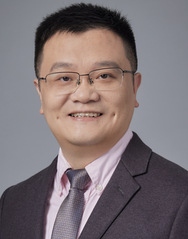个人资料
- 部门: 密码学院
- 性别: 男
- 专业技术职务: 教授
- 研究标签:
- 毕业院校: 香港中文大学
- 学位: 博士
- 学历: 博士
- 联系电话:
- 电子邮箱:
- 办公地址: 华东师范大学普陀校区
- 通讯地址:
- 邮编:
- 传真:
教育经历
2003-2007 上海交通大学计算机系 本科 2008-2012 香港中文大学 信息工程系 博士
工作经历
2025.7—至今,华东师范大学,密码学院,教授 2024.7—2025.6,上海市科学技术委员会,平台中心,副主任(挂职) 2016.8—2025.6,上海交通大学,计算机系,副教授
社会兼职
1. 技术委员会成员(TPC),信息理论研讨会ITW,2024 2. 技术委员会成员(TPC), 国际信息论研讨会ISIT,2026
招生与培养
欢迎对如下方向感兴趣的同学联系本实验室 1. 深度学习,主要是扩散模型 2. 信息论安全与密码学 3. 量子计算
学术成果
(Please refer to https://ichengfan.github.io/)Information theoryAlgebraic Shannon Theory (Informaiton Theory 2.0) F. Cheng, A Reformulation of Gaussian Completely Monotone Conjecture: A Hodge Structure on the Fisher Information along Heat Flow F. Cheng, ‘‘A Comment on On the Completely Monotone Conjecture for Renyi Entropy,’’ submitted to IEEE Trans. Information Theory, 2025 F. Cheng, Gaussian Completely Monotone Conjecture: Progress, History and Future, this talk was invited by Prof. Shing-Tung Yau, YMSC, Tsinghua, March 2025.
Conference papersY. Dong, S. Yang, J. Wang, F. Cheng, ‘‘Achievable Rate Scalability and Latency Analysis of Line Networks with Outage Links,’’ 2024 IEEE International Symposium on Information Theory, (ISIT 2024). B. Dai, F. Cheng, Y. Yang, D. Xia, ‘‘A Linear Feedback Coding Scheme for Computation Over Gaussian Multiple-Access Channels,’’ 2024 IEEE International Symposium on Information Theory, (ISIT 2024). Y. Geng and F. Cheng, ‘‘Duality between finite numbers of discrete multiple access and broadcast channels,’’ 2015 IEEE Information Theory Workshop, Jeju, Korea (ITW 2015). Q. Chen, F. Cheng, T. Liu and R. W. Yeung, ‘‘A Marginal Characterization of Entropy Functions for Conditional Mutual Independent Random Variables,’’ 2015 IEEE International Symposium on Information Theory, (ISIT 2015). F. Cheng, ‘‘Optimality of Routing on the Wiretap Network with Simple Network Topology,’’ 2014 IEEE International Symposium on Information Theory, (ISIT 2014). F. Cheng and Y. Geng, ‘‘Convexity of Fisher Information with Respect to Gaussian Perturbation,’’ 2014 Iran Workshop on Communication and Information Theory, (IWCIT 2014). F. Cheng, R. W. Yeung and K. W. Shum, ‘‘Imperfect Secrecy in Wiretap Channel II,’’ 2012 IEEE International Symposium on Information Theory, (ISIT 2012). F. Cheng and R. W. Yeung, ‘‘Performance Bounds in Secure Network Coding,’’ 2011 IEEE International Symposium on Network Coding, (NetCod 2011).
Journal papersY. Dong, S. Yang, J. Wang, F. Cheng, ‘‘Achievable Rate and Latency of Line Networks with Outage Links,’’ IEEE Journal on Selected Areas in Information Theory, 2024. F. Cheng, ‘‘A Reformulation of Gaussian Completely Monotone Conjecture: A Hodge Structure on the Fisher Information along Heat Flow,’’ submitted, 2022. F. Cheng and V. Y. F. Tan, ‘‘A Numerical Study on the Wiretap Network with a Simple Network Topology,’’ IEEE Trans. Inform. Theory, vol. 62, no. 5, pp. 2481-2492, May 2016. F. Cheng and Y. Geng, ‘‘Higher Order Derivatives in Costa's Entropy Power Inequality,’’ IEEE Trans. Inform. Theory, vol. 61, no. 11, pp. 5892-5905, Nov. 2015. F. Cheng, R. W. Yeung, and K. W. Shum, ‘‘Imperfect Secrecy in Wiretap Channel II,’’ IEEE Trans. Inform. Theory, vol. 61, no. 1, pp. 628-636, Jan. 2015. F. Cheng and R. W. Yeung, ‘‘Performance Bounds on a Wiretap Network with Arbitrary Wiretap Sets,’’ IEEE Trans. Inform. Theory, vol. 60, no. 6, pp. 3345-3358, Jun. 2014. F. Cheng, ‘‘Generalization of Mrs. Gerber's Lemma,’’ Communications in Information and Systems, vol. 14, no. 2, pp. 79-86, 2014. R. K. Panta, R. Jana, F. Cheng, Y.-F. R. Chen, and V. A. Vaishampayan, ‘‘Phoenix: Storage Using an Autonomous Mobile Infrastructure,’’ IEEE Transactions on Parallel and Distributed Systems, vol. 24, no. 9, pp. 1863-1873, Sept. 2013. T. Wu and F. Cheng, ‘‘The Structures of Zero-divisor Semi-groups with Graph Kn * K2,’’ Semi-group Forum, vol. 76, Springer (2008), pp. 330-340.
Machine learningConference papersH. Zhang, F. Cheng, Improving Consistency Distillation with Rectified Trajectories, ICANN 2025. S. Zhu, H. Zhang, Z. Yang, Q. Peng, P. Zhao, H. Wang, F. Cheng, Accelerating Diffusion Sampling via Exploiting Local Transition Coherence, ICCV, 2025. Z. Yang, R. Feng, K. Yan, H. Wang, Z. Wang, S. Zhu, H. Zhang, J. Xiao, P. Wu, K. Zhu, J. Chen, C. Xie, Y. Yang, H. Zhang, Y. Liu, F. Cheng, BACON: Improving Clarity of Image Captions via Bag-of-Concept Graphs, CVPR, 2025. Y. Zhang, M. Xia, Y. Shen, J. Zhu, C. Yang, K. Zheng, L. Huang, Y. Liu and F. Cheng, Exploring Guided Sampling of Conditional GANs, ECCV, 2024. Z. Yang, R. Feng, H. Zhang, Y. Shen, K. Zhu, L. Huang, Y. Zhang, Y. Liu, D. Zhao, J. Zhou, F. Cheng, Lipschitz Singularities in Diffusion Models, ICLR, 2024. (Oral, accpet rate~%1.2) H. Zhang, R. Feng, Z. Yang, L. Huang, Y. Liu, Y. Zhang, Y. Shen, D. Zhao, J. Zhou, F. Cheng, Dimensionality-Varying Diffusion Process, CVPR, 2023. F. Zhou, M. Hu, H. Dong, Z. Cheng, F. Cheng, S. Han, D. Zhang, TaCube: Pre-computing Data Cubes for Answering Numerical-Reasoning Questions over Tabular Data, EMNLP, 2022. (Oral) Z. Cheng, H. Dong, F. Cheng, R. Jia, P. Wu, S. Han, D. Zhang, FORTAP: Using Formulas for Numerical-Reasoning-Aware Table Pretraining, ACL, 2022.
荣誉及奖励
2023年,教育部,高校计算机专业优秀教师奖励计划 2020年,上海交通大学杨元庆优秀青年教师奖 2019年,中国信息论学术年会青年新星奖 2018年,国家教学成果奖二等奖,第六完成人 2018年,上海高校特聘教授(东方学者) 2017年,上海市教学成果奖特等奖,第四完成人
|

